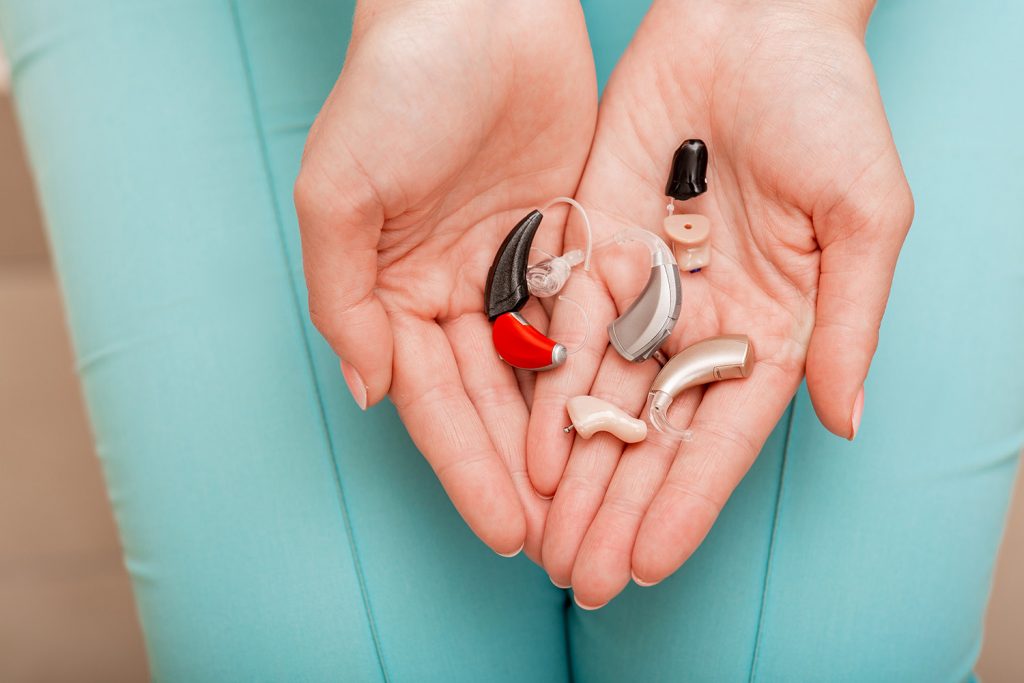Sensorineural hearing loss (SNHL) is a type of permanent hearing loss that occurs when there is damage to the inner ear (cochlea) or the nerve pathways that carry sound from the inner ear to the brain. This type of hearing loss can be caused by a variety of factors, including aging, exposure to loud noise, certain diseases and infections, and genetic factors. The good news is that SNHL can often be treated, though the approach and success of treatment will depend on the cause and severity of the hearing loss.
One of the most common treatments for SNHL is the use of hearing aids. Hearing aids work by amplifying sound and making it easier for a person with hearing loss to hear. There are several different types of hearing aids, including behind-the-ear (BTE), in-the-ear (ITE), in-the-canal (ITC), and completely-in-canal (CIC) hearing aids. The type of hearing aid that is best for an individual with SNHL will depend on several factors, including the severity of the hearing loss, the type of hearing loss, and the individual’s lifestyle and preferences.
Another treatment option for SNHL is cochlear implants. Cochlear implants are devices that are surgically implanted into the inner ear and work by directly stimulating the auditory nerve. They are typically recommended for individuals with severe or profound SNHL who are unable to benefit from hearing aids. Cochlear implants can be effective in improving an individual’s ability to hear, though success rates can vary depending on several factors, including the age at which the hearing loss occurred, the cause of the hearing loss, and the individual’s overall health.
In some cases, medications or other medical treatments may be used to treat SNHL. For example, antibiotics may be used to treat an infection that is causing hearing loss, or corticosteroids may be used to reduce inflammation and swelling in the inner ear. In other cases, surgery may be necessary to repair damage to the inner ear or nerve pathways. However, these treatments are typically only used for specific causes of SNHL and may not be effective for all individuals with this type of hearing loss.
In addition to medical and surgical treatments, there are also several behavioral interventions that can help individuals with SNHL better manage their hearing loss. For example, individuals with SNHL may benefit from speech therapy, which can help them improve their ability to understand speech. They may also benefit from using assistive listening devices, such as personal FM systems, which can make it easier to hear in noisy environments. Additionally, some individuals with SNHL may benefit from using captioning or signing services, which can help them better understand speech and participate in conversations.
In conclusion, SNHL can often be treated, though the approach and success of treatment will depend on the cause and severity of the hearing loss. Hearing aids and cochlear implants are two of the most common treatments for SNHL, and there are also several medical, surgical, and behavioral interventions that can help individuals better manage their hearing loss. It’s important for individuals with SNHL to work with an audiologist or hearing specialist to determine the best treatment plan for their specific needs.
How Can Hearing Aids Help With Sensorineural Hearing Loss?

Sensorineural hearing loss (SNHL) is a type of permanent hearing loss that occurs when there is damage to the inner ear or the nerve pathways that carry sound from the inner ear to the brain. This type of hearing loss can have a significant impact on a person’s ability to communicate and participate in daily activities. Hearing aids are one of the most common treatments for SNHL and can be a highly effective way to improve hearing in individuals with this type of hearing loss.
Hearing aids work by amplifying sound and making it easier for a person with hearing loss to hear. They have come a long way in recent years, with many modern hearing aids featuring advanced technologies such as digital signal processing, directional microphones, and noise reduction algorithms. These technologies work together to enhance speech and reduce background noise, making it easier for individuals with SNHL to hear and understand speech in even challenging listening environments.
One of the benefits of hearing aids is that they are customizable to each individual’s specific hearing needs. A hearing aid professional, such as an audiologist, will perform a comprehensive hearing evaluation to determine the type and degree of hearing loss a person has. They will then recommend the appropriate type of hearing aid, such as behind-the-ear (BTE), in-the-ear (ITE), in-the-canal (ITC), or completely-in-canal (CIC) hearing aids, and make any necessary adjustments to ensure the best possible sound quality.
In addition to improving hearing, hearing aids can also have a positive impact on a person’s overall quality of life. Individuals with SNHL who use hearing aids are often able to better participate in daily activities, such as conversations with friends and family, watching television, or listening to music. They are also often able to return to work or other activities they may have had to give up due to their hearing loss.
Moreover, hearing aids can also help prevent social isolation and depression, which are common in individuals with hearing loss. They can help improve communication with loved ones and reduce feelings of frustration, anger, and anxiety that can often accompany hearing loss.
It’s important to note that hearing aids do require some getting used to. It may take some time for individuals to become accustomed to wearing them and adjusting to the amplified sounds. However, most individuals report that the benefits of using hearing aids far outweigh any temporary discomfort. In addition, modern hearing aids are designed to be comfortable and discreet, making it easier for individuals to wear them all day without discomfort.
Hearing aids can be a highly effective treatment for individuals with sensorineural hearing loss. They work by amplifying sound and making it easier for individuals to hear and understand speech in even challenging listening environments. Hearing aids are customizable to each individual’s specific hearing needs and can have a positive impact on a person’s overall quality of life, reducing social isolation and depression, and improving communication with loved ones. With proper care and regular follow-up appointments with a hearing professional, hearing aids can provide years of improved hearing and a better quality of life for individuals with SNHL.
How Can You Find The Right Hearing Aid for Sensorineural Hearing Loss?

Finding the right hearing aid for sensorineural hearing loss (SNHL) is a crucial step in improving communication and quality of life for those affected by this condition. With so many options available, it can be challenging to determine which hearing aid is the best fit. Here are some steps to help you find the right hearing aid for your SNHL.
Consult with an audiologist: An audiologist is a specialist in hearing and hearing disorders who can perform a comprehensive hearing evaluation. They will assess the type and degree of hearing loss you have and recommend the appropriate type of hearing aid for your needs.
Consider your lifestyle and hearing needs: Before selecting a hearing aid, consider your lifestyle and specific hearing needs. Are you highly active and need a hearing aid that is durable and water-resistant? Do you have trouble hearing in noisy environments and need a hearing aid with advanced noise reduction technology? An audiologist can help you determine which features are most important for your individual needs.
Try before you buy: Many hearing aid providers offer the opportunity to try hearing aids before making a purchase. This allows you to get a feel for how the hearing aids sound and how comfortable they are to wear. You can also use this opportunity to ask questions and get feedback from the audiologist.
Consider the cost: Hearing aids can be expensive, but it’s important to keep in mind that the cost of a hearing aid may also reflect the level of technology and quality. Some insurance plans or government programs may provide coverage for hearing aids, so it’s important to check with your provider for details.
Ask for referrals: Ask friends, family, or co-workers for recommendations. Word of mouth can be a valuable source of information when selecting a hearing aid.
Consider the brand and manufacturer: It’s important to research the brand and manufacturer of the hearing aid you’re interested in. Check for customer reviews and ratings, as well as the manufacturer’s reputation for quality and customer support.
Follow up with regular appointments: Once you’ve selected a hearing aid, it’s important to schedule regular follow-up appointments with your audiologist to ensure that the hearing aid is working effectively and to make any necessary adjustments.
Finding the right hearing aid for sensorineural hearing loss requires careful consideration and a thorough evaluation by a hearing professional. By taking the time to research your options, consider your specific needs, and work with an audiologist, you can increase your chances of finding a hearing aid that provides the best possible hearing experience and improved quality of life.




